Fort Victoria
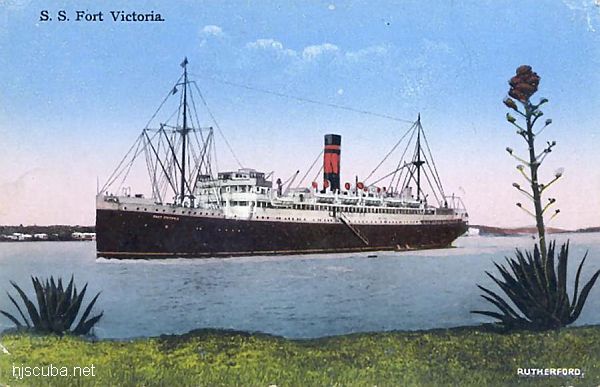
- Type:
- shipwreck, liner, Furness-Bermuda Line, Bermuda
- Built:
- 1913, Scotland, as Willochra
- Specs:
- ( 411 x 56 ft ) 7784 gross tons, 371 passengers & crew
- Sunk:
- Wednesday December 18, 1929
collision in fog with liner Algonquin ( see Mohawk ) - no casualties - GPS:
- 40°28.907' -73°54.398' (AWOIS 1991)
- Depth:
- 50 ft
The huge Fort Victoria lay on its side in the middle of the shipping lane for over a year. Finally, it was completely demolished ( using 25 tons of dynamite ! ) and wire dragged to a clearance of 42 ft ( in 50 ft of water. ) Virtually nothing is left of her. What is, is almost completely buried in the muddy, sandy bottom.
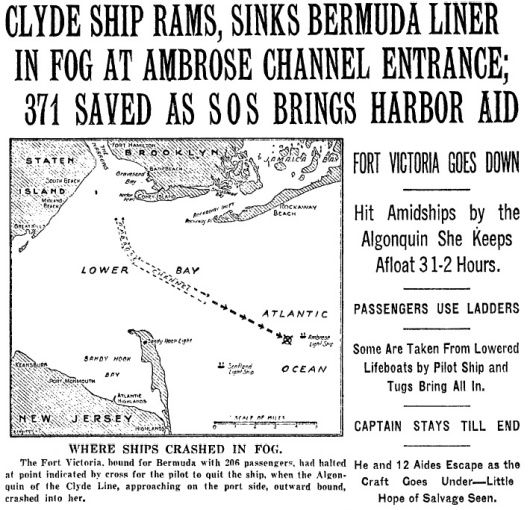
from AWOIS: 1626
H10224/86 -- OPR-C121-WH-86; FOUND DURING MAIN SCHEME HYDROGRAPHY AND SIDE SCAN SONAR OPERATIONS 1200M NORTHWEST OF AWOIS POSITION; DIVER INVESTIGATION REVEALED A VESSEL, AT LEAST 280 FT LONG, 56 FT WIDE, SITTING UPRIGHT IN FINE SAND IN A NORTHEAST-SOUTHWEST DIRECTION; PNEUMATIC DEPTH GAUGE LEAST DEPTH OF 46 FT TAKEN ON STARBOARD SECTION OF BULWARK EXTENDING APPROXIMATELY 9 FT OFF THE BOTTOM. (UPDATED MSD 4/91)
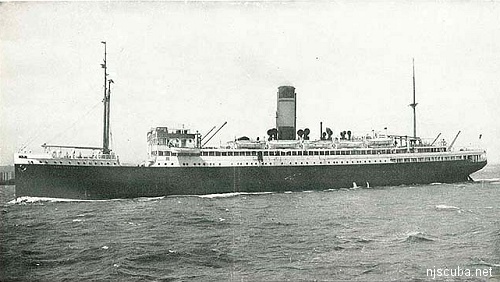
TWIN-SCREW 14,000 TON, OIL-BURNING S.S. "FORT VICTORIA" OF THE FURNESS BERMUDA LINE
BERMUDA STEAMSHIP SERVICE
The palatial, twin-screw steamers, S.S. "Fort Victoria" and S.S. "Fort St. George" of the Furness Bermuda Line, under contract with the Bermuda Government, which are now engaged in the New York-Bermuda route, are of the most advanced type, and their splendid accommodation and up-to-date equipment have done much to make the Bermuda trip such a popular one.
The ships are modern steel, twin-screw. oil-burning vessels, and are of the highest class at Lloyds. Each ship has accommodations for about 400 first-class passengers and is strictly a first-class vessel. The staterooms are comfortable and commodious, all fitted with electric lights, electric fans, and running water. Many of the rooms are equipped with beds instead of the customary berths. For those who prefer more luxurious accommodations, there are available a number of private suites containing sitting room, bedroom and bath - and also a number of cabins deluxe with private bath. The comfort of the passengers has received the fullest consideration, and the state-rooms on both vessels have an air of good taste and attractiveness which will appeal very strongly to discriminating travelers. Stewards and stewardesses are in attendance at all hours and are prepared to give passengers every possible attention.
Special attention has been given to the furnishing and equipment in the public rooms. All passengers like to spend a portion of the time on shipboard in the music saloon and lounges, and these are exceptionally roomy and attractive. The smoking rooms are handsomely and comfortably furnished. The dining saloons, in conformity with the best modern practice, are fitted with small tables. This feature will be particularly appreciated by tourists who are traveling in small parties of their own.
In the "Fort Victoria" and "Fort St. George" are exemplified a number of special features which are really new departures in ship construction. For instance, instead of the small port-holes to which the ocean traveler is accustomed, these ships are fitted with windows (on the upper decks, as will be noted from the accompanying illustrations. This is one of the many new features which have been introduced by the Furness-Bermuda Line to increase the comfort of passengers, and which help to place these ships in the front rank of their class.
The deck space is broad, allowing ample room for deck chairs and also for the pleasant promenade two or three times a day which most people find so invigorating. In the morning hours especially, an easy swing along the deck, fill one's lungs with the fresh bracing sea air, brings a sense of exhilaration and physical well being which is in itself a more than sufficient justification for the trip. A glance at the illustrations will show the broad attractive deck space. There are, of course, a number of deck games which can usually be found in full swing. The lounges, music saloon, smoking room, and veranda cafe are all situated on the promenade deck.
The veranda cafe, which vies in popularity with the lounge and other public rooms, is simply a lounging room out of doors, provided with comfortable wicker chairs and convenient tables, where passengers may have their favorite beverages. Here one can pass an occasional pleasant hour in good company, quite removed from the various activities of the ship.
Sailings of the Furness Bermuda Line Steamers on the New York - Bermuda Route are twice weekly, leaving New York on Wednesdays and Saturdays and returning from Bermuda on Tuesdays and Saturdays, Tickets are interchangeable on either steamer, thus offering unequaled express service. The Furness Bermuda Line is under Contract with the Bermuda Government and the ships of this Company are the only steamers in the New York-Bermuda service which land passengers direct at the Hamilton Dock without transfer by tender. Full particulars of rates, sailing dates, and other information will be supplied on application to Furness Bermuda Line, 34 Whitehall Street, New York, or to any Local Steamship Ticket Agent.
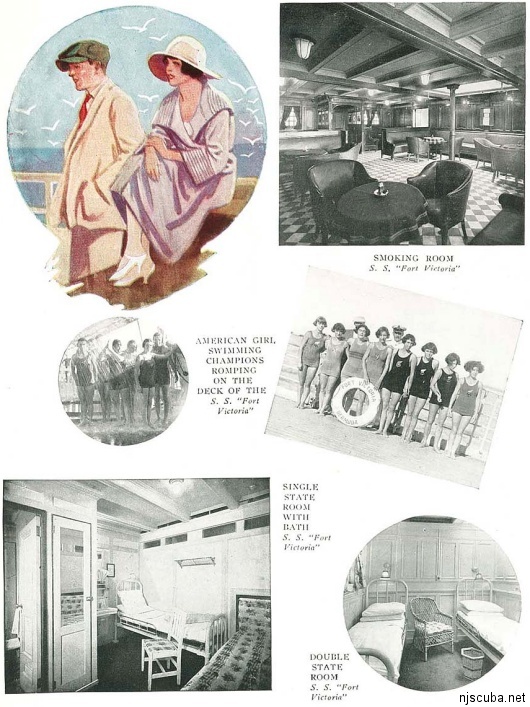
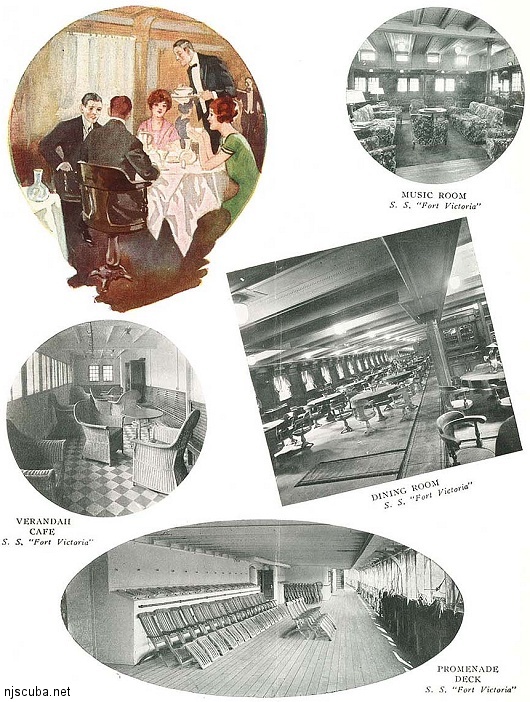
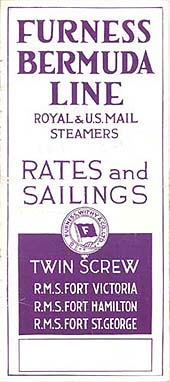
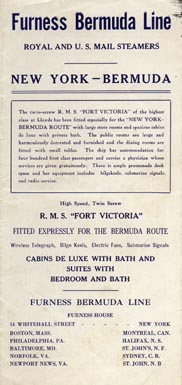
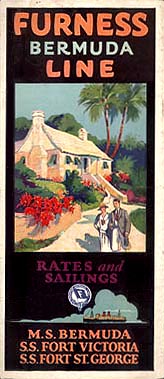
historic materials courtesy of Maritime Timetable Images - www.timetableimages.com
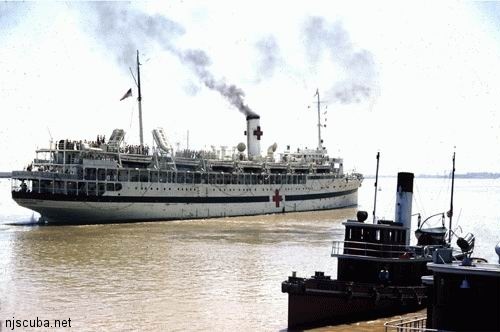

Ellen Brown:
October 19, 2023 at 5:43 pm
My late father, Warren A. H. Brown, was the youngest passenger on Fort Victoria when it was rammed by the Algonquin on 18 December 1929. He was 3 months old. My grandmother, Maybel May Brown, had been walking on deck pushing my father in his pram, when she witnessed the Algonquin appearing out of the fog coming towards Fort Victoria. Needless to say she grabbed my father out of his pram and ran down the deck. Sadly, the family silverware which had been carefully hidden in his pram went down with the boat.